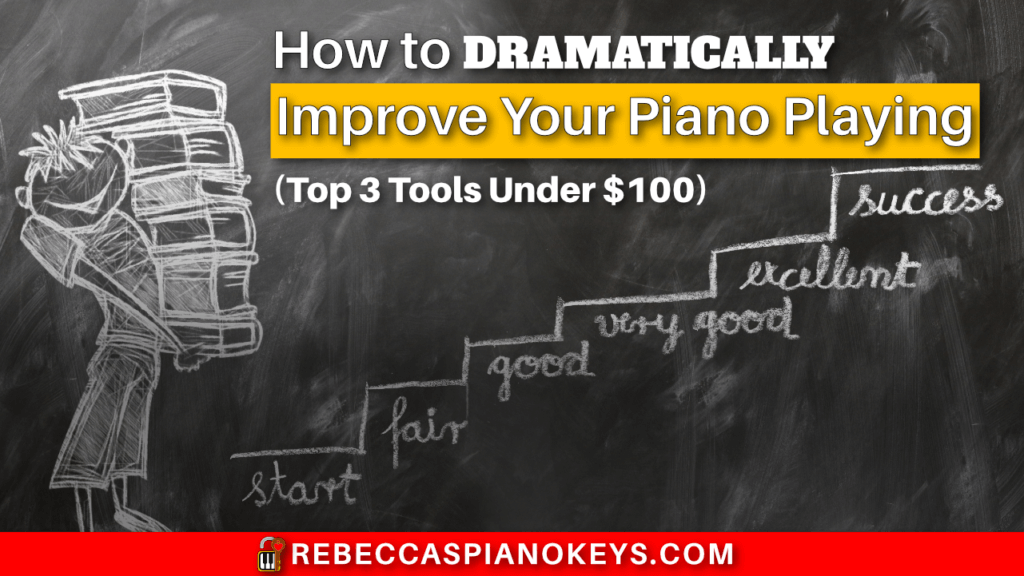Last Updated on October 19, 2022 by Rebecca
Disclosure: Please note that this article contains affiliate links, and that means that I may earn a commission if you buy something through my links. Read my full disclaimer here.
Want to know how to improve piano skills quickly? Looking for the fastest way to improve piano skills? Wondering how to get better at playing piano?
If you're feeling stuck, or you've hit a plateau, or you just want to make sure you get a strong start, there are 3 simple tools you can use that will help you to dramatically improve your piano playing ability very quickly.
Used correctly, these tools will help you maximize the results you get from your practice time. Which means you get better at playing piano… faster!

Tool #1: Adjustable Piano Bench
If your bench is not the proper height for you, you will experience difficulties with your playing technique. This will make playing piano more difficult than it needs to be. And it will also lead to aches and pains (and possibly even injuries!)
Your bench should be high enough that:
- Your forearms are roughly parallel with the floor.
- Your arms are aligned so you have a smooth line from your elbow, all the way down your forearms and over your wrist and the back of your hands and fingers (your wrist does not dip low or rise up).
- Your forearms are roughly level with, or a little above the tops of the piano keys.
An adjustable piano bench like this one can help you to achieve the proper alignment so you can improve your piano technique, which will take your playing ability to the next level!
(And no, adjustable benches aren't just for kids and short people! I'm 5'7″, and I need an adjustable piano bench.)

Some adjustable piano benches are expensive, but you can find some (like the one above) for under $100, which is fantastic when you consider the benefits you'll experience!
(And as a side benefit, an adjustable piano bench will make your piano look extra fancy!)
Tool #2: Metronome
One of the biggest challenges piano players face is maintaining an even tempo.
We all seem to have a tendency to speed up as we get louder, and slow down as we get quieter. (Or to speed up when we're feeling confident and slow down when we hit difficult passages!)
Which is why we use metronomes!
Almost all beginner pianists hate the metronome. They find it difficult to get used to, so they avoid practicing with it. And then they get frustrated because it never gets any easier (because they never practice it!), and their playing never sounds right.
While you don't want to become dependent on your metronome, it is an excellent tool to help you self-monitor and self-correct and tempo/rhythm related issues you're struggling with.
The simplest option is to get a free metronome app on your phone (I like this one for Android devices). Or you can even use the Google metronome (just type the word “metronome” into Google).
But if you want to be able to unplug and play the piano without having your phone nearby (we all know how distracting our phones can be!), it is definitely worth the investment to buy a metronome.
I had a metronome that looked like this when I was growing up.

They're a bit more expensive, but the plastic mahogany grain veneer looks very pretty and posh. It adds a touch of class to your piano nook.
Or you can also opt for a cheaper (though just as effective!) option like this simple black metronome:

The 2 metronomes linked above are powered by winding the key on the side, so you don't need to worry about any batteries.
But if you don't mind a battery-operated metronome, you can opt for this super-compact and portable option:

This kind of metronome is great because you can adjust the volume, and you can even plug in headphones so the ticking doesn't drive your family crazy.
And if money is no object, you can even get a vibrating metronome watch!

(I'll be honest, I've never tried one of these because they are definitely outside of my price range, but I'm so curious to try one out and see what it's like to play with!)
Tool #3: Tripod (so you can record yourself)
Athletes watch footage of themselves playing their sport all the time. It's a valuable practice strategy that helps them to identify weak points and make necessary improvements.
And you can (ahem… should!) use this too to improve your piano playing!
Record yourself playing piano, then watch yourself play.
Listen for any inconsistencies in your tempo or dynamics. Listen for any hesitations or weak spots.
Watch for any awkward or jerky movements. Watch for any tensing of your muscles (shoulders and/or elbows creeping up is a dead giveaway for tense muscles). Watch for any improper posture or technique.
You don't need a fancy camera to record yourself, so all you need is your smartphone. Afterall, you aren't making these recordings for YouTube (although you could if you wanted to); these recordings are for your eyes/ears only.
This super light-weight and inexpensive tripod is perfect for setting up your phone to get all different angles for your recordings.

Or if you want a more heavy-duty option, you can opt for this bigger, stronger tripod.

I have both of these tripods in my piano studio, and I use them both all the time.
(And as a bonus, if you do like the idea of creating performance videos for YouTube, this tripod can help with that too! And that's a great way to put a bit of pressure on yourself so you can increase your motivation to practice!)
So what are the 3 tools that will help you to improve your piano skills quickly?
- An adjustable piano bench
- A metronome
- A tripod
Get your hands on these 3 simple tools, learn how to use them, and you'll be able to practice more effectively and improve your skills much more quickly!


